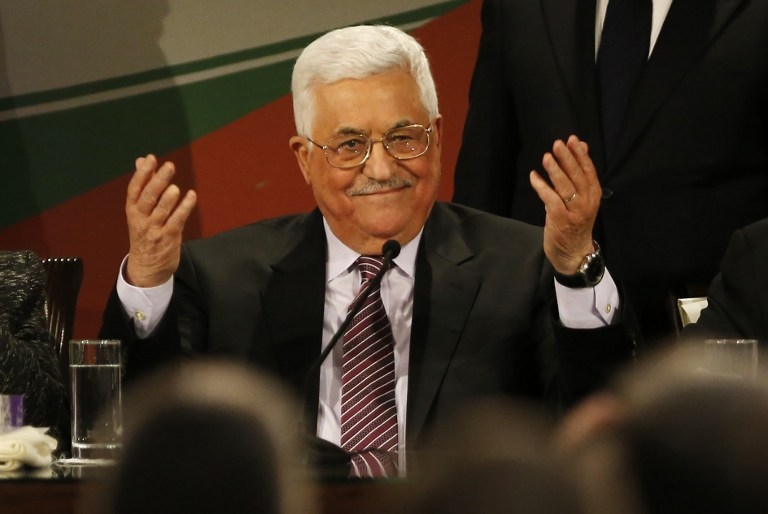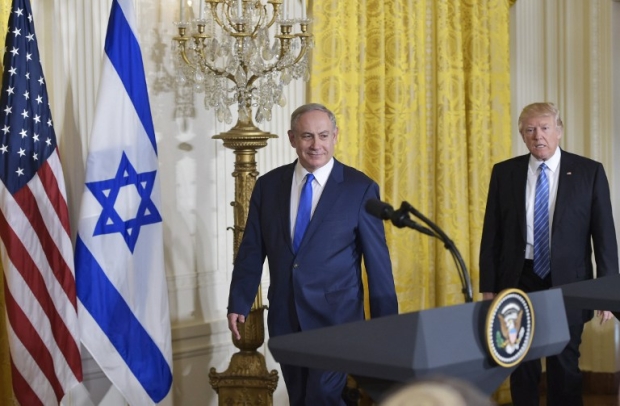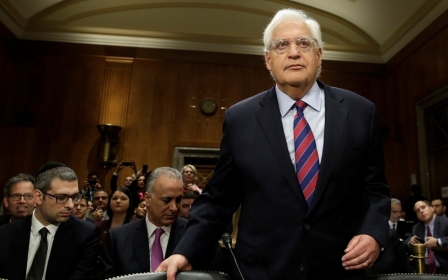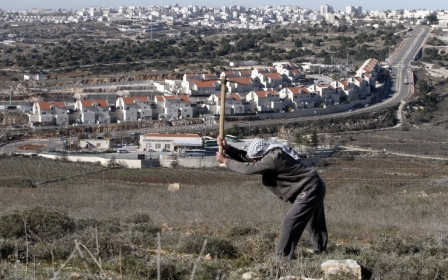Trump throws down the gauntlet to the Palestinian Authority

US President Donald Trump caused international shockwaves on Wednesday by saying that he was not committed to a two-state solution to the Israeli-Palestinian conflict. However, such shock rests largely on two false assumptions.
One is that a viable Palestinian state is still possible when its territory is riddled with illegal Israeli settlements hosting several hundred thousand occupants, and whose size and population are expanding rapidly.
Trump's non-commitment to a two-state solution is no cause for celebration among those who advocate one binational state with equality for both peoples
In less than a fortnight following Trump's inauguration on 20 January, Israel approved construction of more than 6,000 settler homes and a brand new settlement, and passed a law retroactively legalising 4,000 settler homes built on private Palestinian land. Meanwhile, the White House said Trump does not see settlements as an "impediment to peace".
READ: Senior Palestinian official admits no new plan to tackle Israeli settlements
The other false assumption is that previous US administrations were committed to the two-state solution. They and other governments worldwide paid mere lip service to it, providing unflinching military, economic and diplomatic support for Israel despite its relentless efforts to literally wipe Palestine off the map. Trump's predecessor Barack Obama, a hate figure in Israel because of his opposition to settlement expansion, was no different in this regard.
Wedded to delusion
In a nutshell, the two-state solution was one big mirage – worse, a deception – as was the ‘peace process' built around it. But Trump's non-commitment to a two-state solution is no cause for celebration among those who advocate one binational state with equality for both peoples.
Israel's version of a one-state solution envisages permanent control over the Palestinians in an apartheid system that enshrines Jewish supremacy. Indeed, Israel's current government is replete with figures including the prime minister, Benjamin Netanyahu, who reject a Palestinian state.
The Palestinian Authority, however, is still blindly wedded to this delusion, reiterating its commitment to a two-state solution even after the Trump-Netanyahu news conference.
Almost a quarter of a century of negotiating has seen Israel's occupation and colonisation further entrenched. Meanwhile, the regional situation has never looked more hopeless for the Palestinians.
Nothing to lose
Much of the Arab world is woefully divided and unstable post-Arab Spring. Turkey has mended fences with Israel. Egypt has resumed close ties with it under its president, Abdel Fattah al-Sisi. The Gulf states are preoccupied with Iran's regional ambitions and the Palestinian faction Hamas has been ostracised by Tehran, Damascus and Lebanon's Hezbollah movement for supporting the Syrian revolution.
However, it is precisely the desperation of the situation that gives the PA options, because it has nothing to lose. It could revoke recognition of Israel, which it has threatened to do if Trump makes good on his pledge to move the US embassy to Jerusalem. The PA could carry out its threat, made in December, to take more steps against Israel at the International Criminal Court.
READ: 'Two-state solution was a dream': Arab media on US policy shift
It could reinvigorate efforts to join international organisations and treaties and gain greater recognition. More effective options would be to endorse the increasingly effective Boycott, Divestment and Sanctions movement, and to scrap security cooperation with Israel.
The PA could even formally endorse the one-state solution, transforming the Palestinian cause from a liberation struggle to a civil rights movement. Polls show a significant rise in the popularity of the one-state option among Palestinians (with one poll in September 2015 showing majority support), and a solid majority believing a two-state solution is no longer possible.
Reinvigorate - or dissolve
If the PA is worried about retaliatory measures by Israel and funding cuts from Western donors, it should consider that Israel and its allies have a vested interest in avoiding its collapse because this would result either in Hamas filling the void, or in Israel having to take responsibility for the occupied population (which it is legally obliged to do anyway). Israel is vehemently opposed to either scenario.
If the PA is worried about retaliatory measures by Israel and funding cuts from Western donors, it should consider that Israel and its allies have a vested interest in avoiding its collapse
However, this should not discount self-dissolution as an option, which the PA has threatened to do before. After all, it has proven itself utterly incapable of achieving Palestinian self-determination, which is its raison d'etre. Better, then, for the PA to force Israel to shoulder the burden of the occupation rather than act as its subcontractor.
Sadly, however, the PA remains committed to a bankrupt framework, while prioritising personal privilege, party interests and international acceptance over effective steps to pursue its people's rights.
Its president, Mahmoud Abbas, continues to consolidate power, years after his term expired, amid a crackdown on dissent.
He also bluntly refuses to endorse BDS (despite Israel and its allies labelling it a strategic threat) or to scrap security coordination with Israel, which he has described as "sacred" despite the vast majority of Palestinians understandably opposed to their own leaders cooperating with their occupier.
If it is too short-sighted, obtuse or invested to entertain a necessary paradigm shift in thinking and strategy, it is not only rendering itself irrelevant, but worse, part of the problem rather than part of the solution.
- Sharif Nashashibi is an award-winning journalist and analyst on Arab affairs. He is a regular contributor to Al Arabiya News, Al Jazeera English, The National, and The Middle East magazine. In 2008, he received an award from the International Media Council "for both facilitating and producing consistently balanced reporting" on the Middle East.
The views expressed in this article belong to the author and do not necessarily reflect the editorial policy of Middle East Eye.
Photo: Palestinian president Mahmoud Abbas gestures after delivering a speech on the second day of the 7th Fatah Congress in November 2016 at the Palestinian Authority headquarters in Ramallah (AFP)
This article is available in French on Middle East Eye French edition.
Middle East Eye propose une couverture et une analyse indépendantes et incomparables du Moyen-Orient, de l’Afrique du Nord et d’autres régions du monde. Pour en savoir plus sur la reprise de ce contenu et les frais qui s’appliquent, veuillez remplir ce formulaire [en anglais]. Pour en savoir plus sur MEE, cliquez ici [en anglais].







